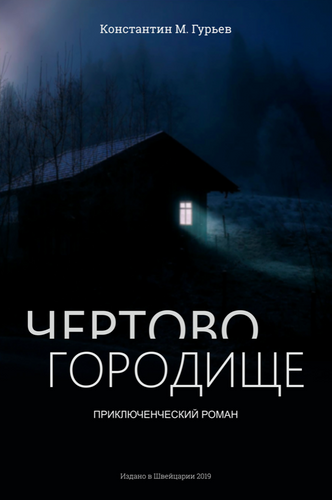KONSTANTIN M. GURJEV

I am Konstantin Mstislavovich Guryev, a writer. I want to present to your attention an unusual story – a story about a novel.
First, a few words about yourself. I was born in 1951 in Tyumen and have lived here all my life. I left Tyumen for a long time twice: two years – service in the army (Irkutsk), four years – internship and postgraduate studies (Leningrad University).
Historian – Germanist, studied the party system of Germany 60-70 years. Taught at the History Department of Tyumen University. In 1988 – 1993 was its dean. It was at the time when "beliefs" and "points of view" began to change rapidly during the rebuild that I became seriously interested in the history of Russia. Over time, I came to the assumption that the interest in history, which is so actively trying to "awaken" until now, rather causes a backlash and ordinary people who have not spent years studying history as a science, it is difficult, but rather simply impossible, to understand the essence of a particular period of our history. That is why, preparing for the completion of teaching activities due to age, I turned to literary activities.
My previous five novels, published in Russia, are an artistic description of events from the lives of two different characters.
The first hero is the journalist Igor Korsakov. The texts are written, as it seems to me, in the genre of a political investigative novel. Korsakov's element is the collision and interweaving of events of our time and the relatively recent past, the struggle of political forces, which never stops, but takes on new and new forms. Igor Korsakov finds himself involved either in the story of the "Yekaterinburg execution" of 1918, which different people are trying to use to their advantage today, or in the story related to the conspiracies of the thirties of the last century.
The second hero, the second line – Artem Kolchugin. I tried to write these texts in the genre of political chronicles. A man born at the beginning of the twentieth century, Kolchugin is aware of his responsibility and does not step aside when events seem to get out of control. An honest and conscientious person, he becomes a participant in the events taking place on the eve of the signing of the non-aggression treaty in August 1939, and then, in my next work, he is engaged in finding documents related to the Katyn tragedy.
After these words, it becomes clear to the reader that neither that character nor the other could exist without being connected with real events. And that's right, but!.. The novel "The Devil's Hillfort", which I would like to introduce to the European Reader, is in a sense my debut.
The events of the novel are not connected with any specific historical dates, but the whole history of Siberia is an Event! The action of "Devil's Hillfort" takes place in the Siberian hinterland, in a taiga village, where History and Fate brought together and bred the paths of many people at many times. Peasants who were dissatisfied with their share fled to Siberia, believers who did not recognize the official state church left for Siberia. Criminals and rioters were sent to Siberia. The Decembrists, who were the first in the Russian Empire to oppose autocracy, were exiled to Siberia. Participants of the Polish uprisings were exiled to Siberia. There are many who were sent to Siberia in the hope that these people would no longer become a concern for the authorities… Many of them returned to their native lands after the expiration of their sentences, but many stayed here, creating and strengthening a very special, incomparable Siberian character! Removed from the capitals, from the big cities, these people continued to live and create in the same way as before, because their spirit did not fade in the Siberian expanses…
Not only to the Decembrists can we attribute Pushkin's words "Keep proud patience in the depths of Siberian ores"... This spirit has not been eroded by time, it has been preserved in the way of life and the way of thinking of many Siberians who continue to believe that their fate is not in the hands of the authorities or priests, but in their own hands, and they will receive retribution not according to intentions, but according to achievements…

